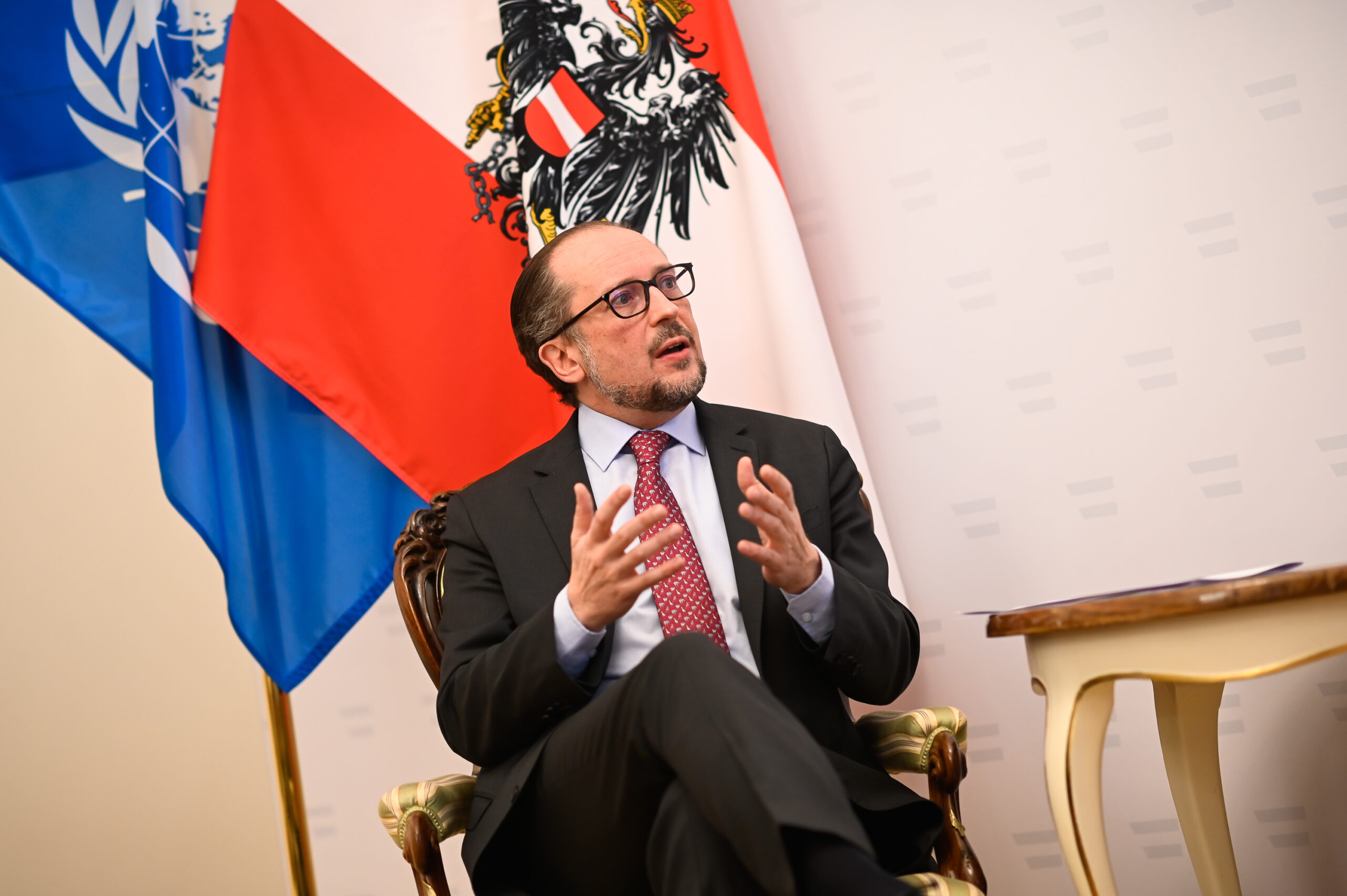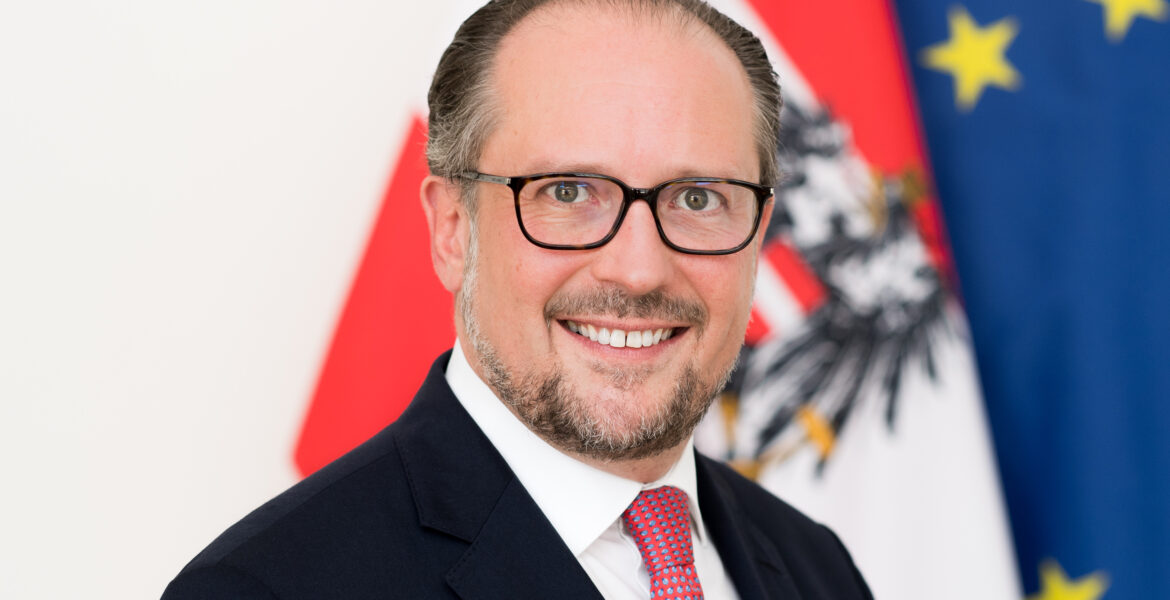SOCIETY Magazine spoke with Austria’s Federal Minister for European and International Affairs, Mag. Alexander Schallenberg, about current pressing issues, Austria and its role as a neutral mediator and the importance of a multilateral approach in times of crises and beyond.
Your second term as Foreign Minister started on January 7, 2020. What are the top priorities on your agenda this time? Which aspects of your work as Foreign Minister are of particular concern to you?
Among the 193 UN member states, only about a quarter still represent this Western, open democratic model of life, which is precisely what we must defend together. For me, a key objective of my work as Foreign Minister can be summed up in one sentence: I want to help ensure that my children and grandchildren also grow up in a free and open society – with freedom of speech, freedom of assembly, freedom of religion and all the fundamental rights we have achieved since 1848 or perhaps since the French Revolution.
The COVID-19 crisis underlined once more the degree of globalization our world has reached. Can Austria draw lessons from this situation and if so, which ones? Do we have to reconsider certain dependencies and certain approaches?
COVID-19 has taught us the hard way that much we take for granted is more vulnerable than we believe. The pandemic has given us a powerful lesson in the necessity of international solidarity and multilateralism in the face of global challenges. After all, even the toughest “my-state-first unilateralists” looked for international cooperation to secure medical supplies and assistance to overcome the social and economic crisis. I hope that we learn from the pandemic to avoid the mistake of falling into navel-gazing within our own national or European borders.
Since April 2021, the Iran Nuclear Talks are taking place again in Vienna, with the Republic of Austria having a long history of being a “neutral mediator”. How can this role be successfully maintained in view of recent criticism? Austria was widely accused of taking sides in the Middle East conflict. How would you define Austria‘s foreign policy?
We are happy to have the negotiations on the JCPOA back in Vienna, and we are quite optimistic that despite all difficulties the “Vienna spirit” will work its magic again. Austria’s role continues very much as a host to international organisations, conferences and negotiations and as builder of bridges. This applies of course also to Israel and the Arab and Muslim world.







(c) BMEIA/Dragan Tatic, Michael Gruber, Alexander Paier
We have shown our solidarity with Israel because we will not remain silent when more than 4000 rockets are fired on civilian targets in Israel by Hamas – a terrorist group notorious for its antisemitism that denies Israel’s right to exist and does not shy away to put Palestinian civilians in harm’s way. To anyone who accuses us of taking a one-sided position, I want to be very clear: there can be no neutrality in the face of terror. We have deeply regretted the loss of civilian lives on both sides, including children, and welco- med the cease-fire between Israel and Hamas. Now, we must pick up the pieces and restore not only houses, schools and hospitals, but very importantly confidence – with a view to a return to direct talks between the sides. Our position on the Middle East conflict has not changed: we want a negotiated two-state solution, based on international law, as the only viable option for a just and lasting peace. Palestinians and Israelis alike have the right to live in peace and security – and they should do so as good neighbours to each other and to all other states
in the region. Austria clearly shows its stance, based on open and democratic values – for me, this is a meaningful foreign policy.
Portugal is holding the EU-presidency until the end of June 2021. Could you summarize the past six months? And what do you expect from the forthcoming EU presidency of Slovenia?
Portugal took over the presidency at a very challenging time. Almost all EU Member States were still facing the effects of the second wave of the COVID-19 pandemic. In line with the Portuguese Presidency‘s motto: `Time to deliver: a fair, green and digital recovery‘, we all have joined our efforts to overcome the crisis and rebuild our economies. One recent success of the current presidency has been the agreement on an interoperable digital COVID-19 certificate. It will be applicable as of July 1 and will be particularily important to get tourism going again. We have been very vocal in favour of such a certificate from the outset. EU recovery and resilience will remain on our agenda during the Slovenian Pre-
This global virus makes it clear to all of us that no country – no matter how large and prosperous – can solve crises of this dimension on its own.
sidency in the second half of the year. Austria has been consistent with its commitment to the Western Balkans and EU enlargement. We welcome that the incoming Slovenian Presidency has underlined the EU perspective and the need for progress in this regard as one of its presidency priorities. Here we need EU credibility to have stability in the region. I think we have a common goal: 2021 must not be another lost year for the Western Balkans.
Would you say that the diplomatic work in general has shifted towards a more multilateral approach, rather than a bilateral one? At the same time EU members are confronted with national regulations in the COVID-19 crisis.
The pandemic knows no nationalities. Climate change also does not stop at national borders. That‘s why we need functioning international organizations and a strong multilateral approach now more than ever. For the first time in recent history, all states and all societies across the world are confronted with one and the same challenge. This global virus makes it clear to all of us that no country – no matter how large and prosperous – can solve crises of this dimension on its own. After an initial moment of egoistic shock in spring, solidarity has quickly established itself as a principle for action, especially in the European Union. The pandemic has brutally shown us how global threats affect us all in the same way and how dependent we are on each other. Only if all countries pull together do we have a real chance of actually over- coming such challenges. From the very beginning, Austria, together with other EU Member States, has chosen a multilateral approach when it comes to access to vaccines. Yes, I still firmly believe that this was and is the right approach: `No one is safe until ever- yone is safe.´
Health policy is primarily a national re- sponsability. But there is a greater awareness that we are better off if we work together and pull together.
Health policy is primarily a national responsibility. But there is a greater awareness that we are better off if we work together and pull together. One of these joint projects was certainly the procurement and distribution of vaccines against COVID-19, where we have developed a clear, joint strategy at the European level. In addition, it has become clear very quickly that the European Union is a community of solidarity, for example in the mutual admission of intensive care patients, the provision of medical protective equipment or the very close exchange on border management.
On a more personal note: You have been growing up as a diplomat’s child. How did this upbringing influence you and your career choice? How do you – as the current Foreign Minister – still profit from these early international experiences?
I spent part of my childhood and youth in India, Spain and France where my father was posted. Growing up in different countries and learning so much about different cultures has of course enriched my life extremely. Still, it took me many years to make the decision to become a diplomat myself.

